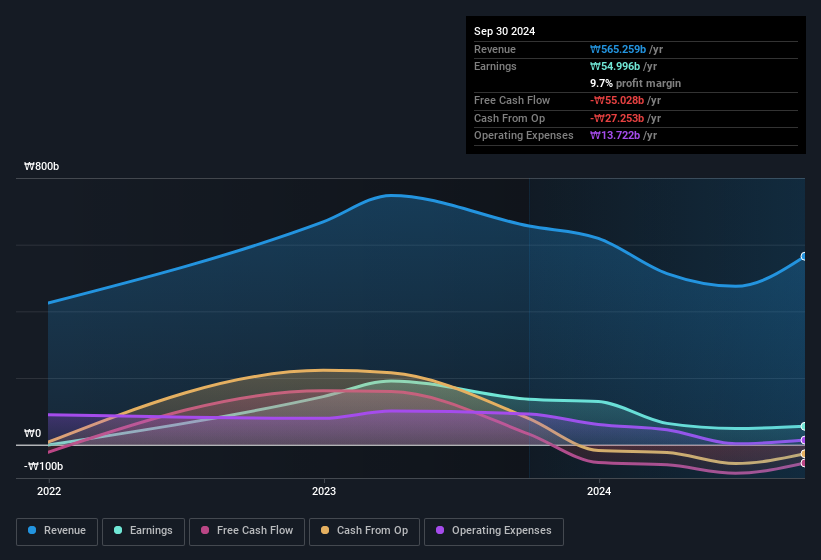- South Korea
- /
- Metals and Mining
- /
- KOSE:A092790
NEXTEEL's (KRX:092790) Shareholders Have More To Worry About Than Only Soft Earnings
Last week's earnings announcement from NEXTEEL Co., Ltd. (KRX:092790) was disappointing to investors, with a sluggish profit figure. We did some analysis, and found that there are some reasons to be cautious about the headline numbers.
Check out our latest analysis for NEXTEEL

A Closer Look At NEXTEEL's Earnings
Many investors haven't heard of the accrual ratio from cashflow, but it is actually a useful measure of how well a company's profit is backed up by free cash flow (FCF) during a given period. To get the accrual ratio we first subtract FCF from profit for a period, and then divide that number by the average operating assets for the period. The ratio shows us how much a company's profit exceeds its FCF.
Therefore, it's actually considered a good thing when a company has a negative accrual ratio, but a bad thing if its accrual ratio is positive. While it's not a problem to have a positive accrual ratio, indicating a certain level of non-cash profits, a high accrual ratio is arguably a bad thing, because it indicates paper profits are not matched by cash flow. Notably, there is some academic evidence that suggests that a high accrual ratio is a bad sign for near-term profits, generally speaking.
NEXTEEL has an accrual ratio of 0.25 for the year to September 2024. Therefore, we know that it's free cashflow was significantly lower than its statutory profit, which is hardly a good thing. Even though it reported a profit of ₩55.0b, a look at free cash flow indicates it actually burnt through ₩55b in the last year. It's worth noting that NEXTEEL generated positive FCF of ₩32b a year ago, so at least they've done it in the past.
Note: we always recommend investors check balance sheet strength. Click here to be taken to our balance sheet analysis of NEXTEEL.
Our Take On NEXTEEL's Profit Performance
NEXTEEL didn't convert much of its profit to free cash flow in the last year, which some investors may consider rather suboptimal. Therefore, it seems possible to us that NEXTEEL's true underlying earnings power is actually less than its statutory profit. Sadly, its EPS was down over the last twelve months. The goal of this article has been to assess how well we can rely on the statutory earnings to reflect the company's potential, but there is plenty more to consider. If you want to do dive deeper into NEXTEEL, you'd also look into what risks it is currently facing. For example, we've found that NEXTEEL has 5 warning signs (2 are a bit unpleasant!) that deserve your attention before going any further with your analysis.
This note has only looked at a single factor that sheds light on the nature of NEXTEEL's profit. But there are plenty of other ways to inform your opinion of a company. Some people consider a high return on equity to be a good sign of a quality business. While it might take a little research on your behalf, you may find this free collection of companies boasting high return on equity, or this list of stocks with significant insider holdings to be useful.
Valuation is complex, but we're here to simplify it.
Discover if NEXTEEL might be undervalued or overvalued with our detailed analysis, featuring fair value estimates, potential risks, dividends, insider trades, and its financial condition.
Access Free AnalysisHave feedback on this article? Concerned about the content? Get in touch with us directly. Alternatively, email editorial-team (at) simplywallst.com.
This article by Simply Wall St is general in nature. We provide commentary based on historical data and analyst forecasts only using an unbiased methodology and our articles are not intended to be financial advice. It does not constitute a recommendation to buy or sell any stock, and does not take account of your objectives, or your financial situation. We aim to bring you long-term focused analysis driven by fundamental data. Note that our analysis may not factor in the latest price-sensitive company announcements or qualitative material. Simply Wall St has no position in any stocks mentioned.
About KOSE:A092790
NEXTEEL
Manufactures and sells steel pipes in South Korea and internationally.
Excellent balance sheet and fair value.
Market Insights
Community Narratives



